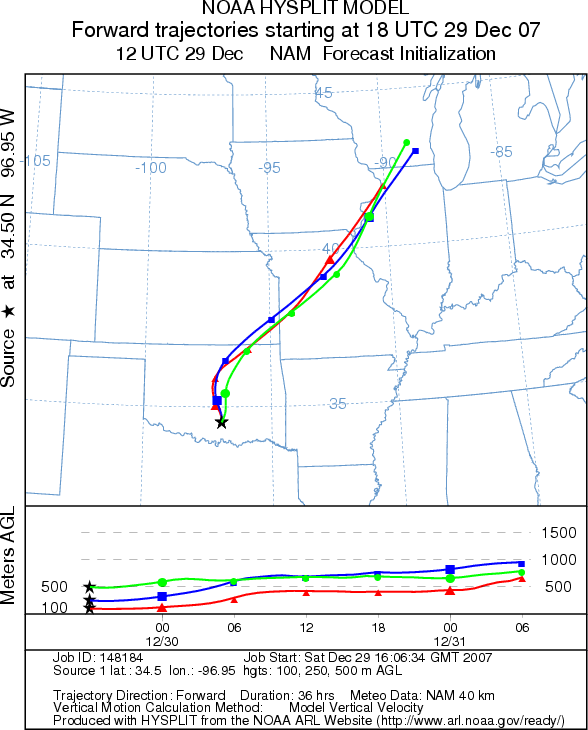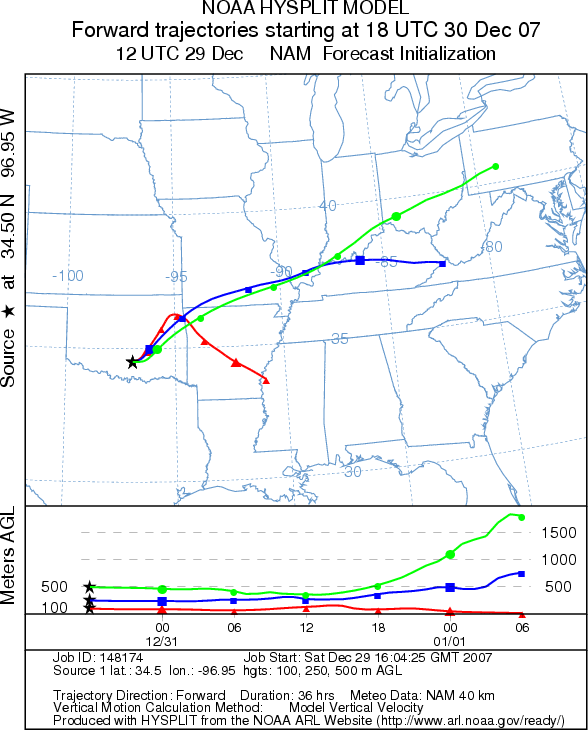Metropolitan Area |
Exposure Risk |
|
Oklahoma City |
Low to Moderate/Low |
|
Tulsa |
Low to Moderate/Moderate |
|
St. Louis MO |
Low/Low |
Date Issued: 29 December 2007
Mountain Cedar Location(s): Arbuckle Mountains, OK
Regional Weather: Saturday and Sunday, December 29 and
30 TX/OK: The weather today will be the beginning of a warming trend for the weekend. Temperatures in Oklahoma
will be in the mid 40s to lower 50s, with partly cloudy skies and morning patches of fog. Winds will be from the
south around 10 mph decreasing into the evening to light and variable conditions. Warmer temperatures will rule
throughout Texas with the highs in the lower to mid 60s over and around the Edwards Plateau. Skies will be partly
cloudy along the northwestern area and sunny across the eastern and southeastern regions. Winds will be light,
5 to 10 mph, from the east to southeast along the eastern edge of the Edward Plateau and from the south to southwest
over western regions. Overnight winds will decrease overnight becoming light and variable in most areas. Skies
will be clearing overnight with low morning temperatures.
On Sunday, sunny conditions will return to the region with high temperatures in Oklahoma reaching into the 50s
with upper 50s along the southern border with Texas Winds will increase from ~10 mph to 10/15 mph from the south
to southwest. In Texas, high temperatures will rise by 5-10 degrees into the upper 60s to low 70s across the region.
Winds will increase during the day. Sunday morning winds will be ~10 mph from the south to southwest increasing
into the evening hours to 10 to 15 mph. Overnight low temperatures will be in the mid to low 30s to on the Edwards
Plateau, to mid to low 40s along the eastern Edwards Plateau communities.
Trajectory weather: . The air mass trajectories from the Arbuckle Mountains move more to the north-northeast
crossing between Oklahoma City and Tulsa. The trajectories also show rising atmospheric conditions, and are thus
good for pollen entrainment and travel. Trajectories from the Edwards Plateau Texas move to the north-northeast
from the primary area with Juniperus ashei trees over the southeastern corner of Oklahoma into Arkansas and onto
the southeastern corner of Missouri. The trajectories are associated with warm buoyant air traveling rising along
the trajectory, conditions good for pollen entrainment and long-distance travel.
On Sunday winds will continue to be from the southwest until later in the day when they switch to the northwest.
Trajectories move more towards the northeast traveling across the southeastern corner of Oklahoma into Arkansas.
Atmospheric conditions are less buoyant and more stable than on Saturday, but warm temperatures will result in
the highest potential pollen release conditions of the season, to date. Surface winds will be affected by the shift
in winds to a greater extent than at upper elevations, where the trajectories continue on towards the Ohio River
valley.
OUTLOOK: *** Moderate threat today and tomorrow *** Warm temperatures and
lower humidity will be optimal for pollen release on the Edwards Plateau and in Oklahoma today and especially tomorrow.
Cold morning lows on both days will limit pollen release to afternoon hours. However, significant amounts of pollen
may be shed during this warming trend. With atmospheric conditions showing light buoyant air, significant pollen
dispersion downwind will put allergy sufferers in southeastern Oklahoma, Arkansas and southeastern Missouri at
risk today and tomorrow.
Trajectory Start (s) (shown by black
star on map): Sulfur, OK.
ARBUCKLE MOUNTAINS (SATURDAY)

ARBUCKLE MOUNTAINS (SUNDAY)

Prepared by: Estelle
Levetin (Faculty of Biological
Science, The University
of Tulsa, 600 S. College, Tulsa, OK 74104) and Peter K Van de Water
(Department of Earth and Environmental Science, California State University Fresno, 2576 East San Ramon Avenue,
M/S ST24, Fresno CA 93740-8039). This forecast gives the anticipated future track of released Mountain
Cedar pollen, weather conditions over the region and along the forecast pathway, and an estimated time of arrival
for various metropolitan areas.
Questions: Aerobiology Lab e-mail: pollen@utulsa.edu
Return to Forecasting Home Page